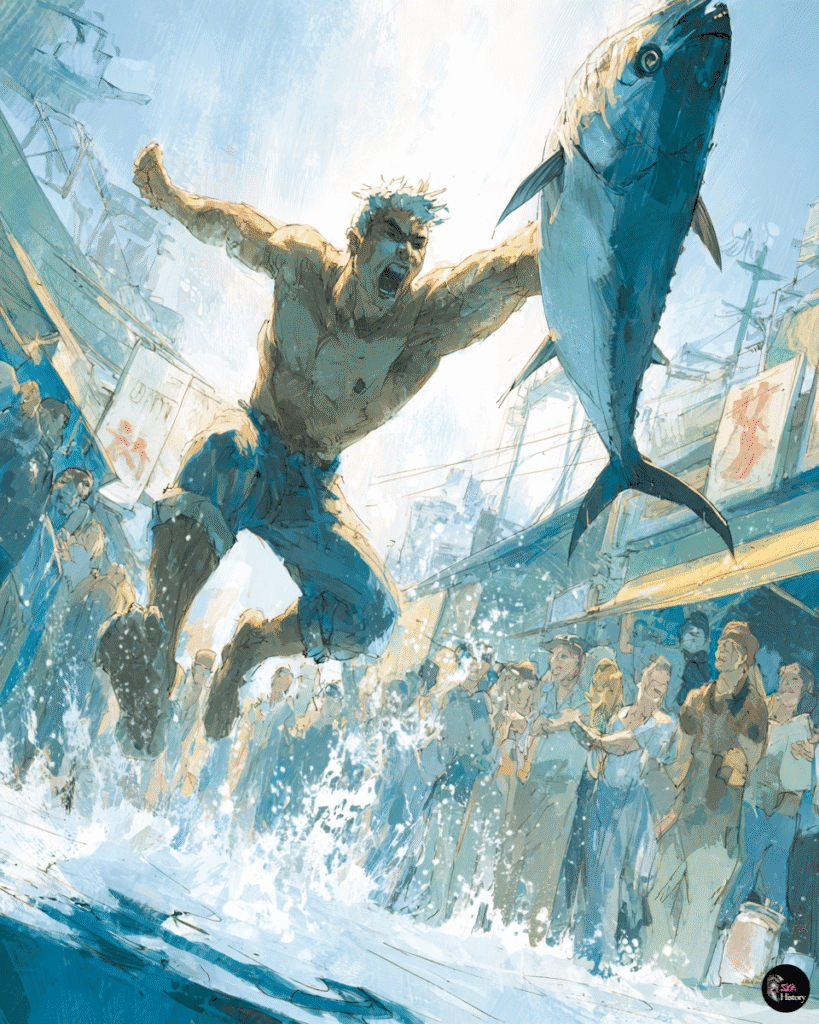In the coastal town of Port Lincoln, Australia, thousands once gathered annually to witness something that sounds like the fever dream of a very specific type of sports enthusiast: grown adults hurling frozen tuna through the air like scaly missiles. This wasn’t performance art or a collective mental breakdown—it was the Tunarama Festival, a beloved 60-year tradition that perfectly captured Australia’s remarkable ability to turn absolutely anything into a competition.
What began in 1962 as a dignified celebration of Port Lincoln’s fishing industry eventually morphed into one of the world’s most gloriously absurd sporting events. The festival drew over 40,000 visitors during Australia Day weekend, transforming the sleepy foreshore into a carnival of maritime madness where the main attraction involved launching dead fish with Olympic-level intensity.
The inaugural festival featured South Australian Premier Thomas Playford cutting ribbons and making speeches about the importance of the local tuna industry. Little did he know he was christening what would become a decades-long tradition of competitive fish-flinging that would put Port Lincoln on the map for reasons the Premier probably never imagined.
When Fish Became Projectiles
The festival’s transformation from respectable industry celebration to aquatic circus began in 1980 when someone—history doesn’t record who, but they deserve a medal—decided that what the event really needed was a tuna tossing competition. The concept was elegantly simple: grab a frozen tuna, wind up like you’re throwing a javelin, and launch that fish as far as your arms and dignity will allow.
The competition quickly became the festival’s crown jewel, drawing contestants who approached the sport with surprising seriousness. Professional athletes began participating alongside local fishermen, treating frozen tuna with the same respect other sports reserve for balls, discs, or javelins. The current world record stands at an impressive 37.23 meters (122 feet), set by Sean Conlin—a distance that required genuine athletic skill and a complete abandonment of conventional sporting dignity.
Both men and women competed in separate divisions, developing throwing techniques that would make track and field coaches weep with either pride or confusion. The competition drew massive crowds who gathered to witness these unique displays of strength, skill, and the very human desire to see how far someone can throw a dead fish.
More Than Just Flying Fish
While the tuna toss became the festival’s signature spectacle, the event offered a full buffet of maritime-themed entertainment. Colorful parades featured children dressed as marine creatures, creating processions that looked like the ocean had emptied itself onto the streets of Port Lincoln. Octopi, seahorses, and fish of every description marched through town in a display that was equal parts adorable and mildly disturbing.
The festival expanded to include boat building demonstrations, sand sculpture contests, and food stalls celebrating local cuisine. Maritime professionals showcased fishing techniques and equipment, while seafood cooking competitions let local chefs display their culinary expertise with the region’s freshest catches. Street parades wound through Port Lincoln’s main thoroughfares, featuring decorated floats and community groups celebrating their town’s unique claim to fame.
What made Tunarama special wasn’t just the absurdity—it was how seriously the community took their absurdity. This wasn’t a joke that got out of hand; it was a carefully organized, professionally managed event that happened to revolve around launching fish through the air. The festival became a genuine source of civic pride, showcasing Port Lincoln’s identity as Australia’s seafood capital while providing entertainment that was uniquely, unmistakably Australian.
The End of an Era
After six decades of flying fish, the original committee announced the festival’s closure in 2023, marking the end of an era for this iconic South Australian event. The decision sent shockwaves through the community and disappointed thousands of annual visitors who had come to view the festival as an essential part of their Australia Day celebrations.
The longest-running festival in regional South Australia had become more than just entertainment—it was a cultural institution that strengthened community bonds and put Port Lincoln on the international map. Local government and tourism bodies are now actively working to preserve this cultural legacy, with the Port Lincoln Council seeking public input to identify the festival’s best attributes for potential future celebrations.
The festival’s conclusion leaves behind a remarkable legacy: proof that with enough community spirit and a willingness to embrace the ridiculous, even the most mundane activity can become a beloved tradition. For 60 years, Port Lincoln proved that Australians could turn anything into a sport, and in doing so, created something genuinely special—a celebration that was simultaneously completely absurd and deeply meaningful to the community that created it.
The empty foreshore where thousands once gathered to witness airborne seafood now serves as a reminder of what happens when a community decides to take something silly and make it sacred. In a world that often takes itself too seriously, Tunarama stood as a testament to the power of organized absurdity and the very human need to compete, even when the competition involves hurling dead fish through the Australian sky.

